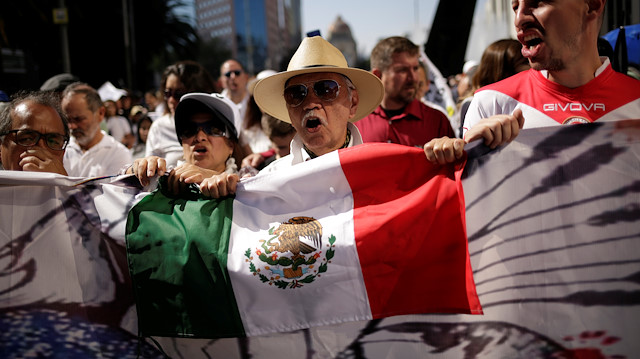
Political and economic events vied with crime for headlines as the nation struggled with internal and external issues
As 2019 draws to a close, Mexico leaves behind a volatile year marked by high and low points, from the launch of the country’s #MeToo movement to confrontations with Bolivia.
The following is a brief rundown of the main events.
January 2019:
Hidalgo pipeline explosion: A pipeline in Hidalgo, Mexico exploded, killing at least 137 people. The blast reportedly occurred while people were attempting to steal fuel. Stealing fuel from pipelines has long been a problem for Mexico, which experienced extremely high gas prices around this time. Mexican President Andres Manuel Lopez Obrador campaigned on fighting corruption and lowering gas prices. This event took place a little after a month of him cracking down on fuel theft.
February 2019:
March 2019:
#MeToo movement: About a year after the #MeToo movement rocked the U.S., it arrived in Mexico. As part of the movement, women began denouncing high-profile men’s histories of sexual harassment and abuse. In March 2019, Mexican women – mostly in the media industry – began calling out men who have a history of abuse.
April 2019:
Immigration: In the middle of immigration controversies between the U.S. and Mexico, more than 1,000 migrants and refugees escaped from a detention center in the southern state of Chiapas. About half of the people reportedly returned. Mexico was overwhelmed with U.S. President Donald Trump’s decision to send thousands of migrants back to the country earlier in the month. With resources spread thin, government officials said the escape was made possible.
May 2019:
Tariffs: At the end of the month, Trump announced he would place a 5% tariff on all Mexican imports. He levied the tariff as a threat, hoping it would make Mexico tighten up its border security so that fewer migrants and refugees would reach the U.S. This announcement marked the start of more aggressive immigration policies in Mexico.
June 2019:
U.S.-Mexico relations: Trump recalled the tariff threat after President Lopez Obrador announced that Mexico would curb migration reaching the southern border of the U.S. One Mexican official said the country would curb migration to the U.S. by 60%.
July 2019:
El Chapo’s assets: El Chapo Guzman was given a life sentence in the United States. This led to a conversation about who would receive his assets. El Chapo has since asked for his money to be given to indigenous communities in Mexico. President Lopez Obrador approved of the idea, saying the conversation has prompted the Mexican government to ask the United States to return all assets from Mexican criminals to the country.
August 2019:
Attacks on journalists: In the time span of one week, three journalists were killed in Mexico. The country has long struggled with violence against journalists and press censorship. After the August attacks and a bomb threat against a newspaper, journalists banded together to demand more protection.
September 2019:
Abortions: The Mexican state of Oaxaca legalizes abortion, making it the second place in the country to do so. Mexico City has allowed abortions since 2007.
October 2019:
Culiacan, Sinaloa: The Mexican government’s poorly planned attempt to arrest El Chapo Guzman’s son prompted a worldwide conversation about the power of Mexican organized crime groups. After arresting the son, armed men took to the streets, setting cars on fire, kidnapping authorities and shooting in the air. The men, who have links to the Sinaloa cartel, demanded the release of the drug lord’s son. The government capitulated and returned the son in one of the most controversial moves under Lopez Obrador’s administration.
November 2019:
Evo Morales in Mexico: After former Bolivian President Evo Morales resigned from his position amid protests, Mexico offered him political asylum. Morales arrived shortly after and continued to advocate for his supporters from Mexico. The country’s move to ally itself with Morales has heightened tensions between Bolivia and Mexico.
December 2019:
USMCA: The trade deal between Mexico, the United States and Canada got the green light in Mexico. President Lopez Obrador said senators have already informally approved the deal. He added that the government is waiting for the United States to ratify the trade agreement before it can move forward. As part of the deal, Lopez Obrador has vowed to improve labor conditions in the country. The proposed deal will replace the North American Free Trade Agreement.


